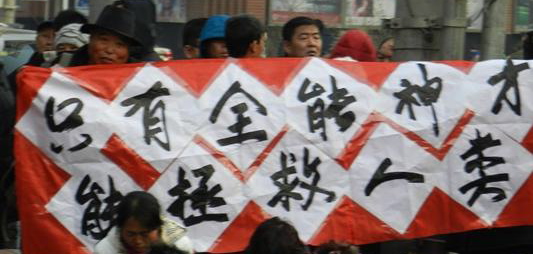The Great Red Dragon and the Lightning Storm: China's Increasing Pressure on Fringe Religious Groups

Rather than making them go away, China’s crackdown on fringe religious groups like Eastern Lightning is making them more determined.
The Chinese Government’s ongoing attempts to silence the dissident voices of its Uighur Muslim minority, China’s ‘Fifth Poison‘, appear to be leading the group to resort to more extreme and violent methods of expressing their frustration including a Tiananmen Square car attack and Kunming Station knife attack.
Last month’s public bludgeoning to death of a mother in a McDonalds at the hands of members of the banned sect ‘Eastern Lightning’ reveals some parallels. While the groups themselves are vastly different (the Uighurs are a suppressed ethnic and religious minority while Eastern Lightning is a quasi-Christian cult) the Chinese Government’s method of dealing with them is the same. However, just as with the Uighurs, by escalating its crackdown on Eastern Lightning, the Chinese Government is inadvertently increasing the likelihood of violent outbursts.
Eastern Lightning’s Ideology
Also called the Church of the Almighty God, members of Eastern Lightning preach that Christ returned in 1992, reincarnated as a woman from Central China known as ‘Lightning Deng’. Since its inception in the mid-nineties, the group has been linked to kidnappings, bizarre extortion attempts (including the widespread use of seduction as a recruitment technique) and extreme violence (the group displays a gruesome penchant for ear removal and limb breaking). Consequently it has been on the Chinese Ministry of Public Security’s list of 14 banned religious groups since 1995. But the Chinese Government has an extra impetus for putting an end to Eastern Lightning. According to Eastern Lightning’s scripture ‘Heaven is to destroy the Communist Party’ and Christ was reincarnated as Lightning Deng in order to begin a righteous struggle to slay the ‘Great Red Dragon’, China’s Communist Party (CPC).
Eastern Lightning also has an apocalyptic element. In the early nineties the group was one of many which preached that the world would end in 2012 and set about preparing believers for Armageddon by helping them part with their money and possessions. These tactics did not escape the attention of the Government which consequently intensified its crackdown on the group. Ironically the amplified pressure increased Eastern Lightning’s drive as well as escalated its rhetoric against the CPC. Kevin Yeung, the General-Secretary of Hong Kong’s Concern Group on Newly Emerged Religions, has been monitoring Eastern Lightning since 2008 and recently reported ‘an increasingly aggressive push by the group to convert Christians in the territory over the past two years’.
Emily Dunn, an Asian Studies academic at the University of Melbourne, believes that the Government’s heavy suppression of illegal Christian groups or ‘house churches’ has actually encouraged Eastern Lightning’s success by making it more difficult for the faithful ‘to tell one underground organisation talking about Christ from another’.
Even religious movements that are not focused on destroying the CPC are regarded as a threat. Also making the list of China’s illegal Christian groups are the Apprentice Society, which encourages adherents to shun work in favour of days spent praying at their churches, and the Unification Church whose members are expected to enter into ‘collective marriages’.
The Chinese Government has historical reasons to be wary of apocalyptic religious movements: in the 19th century the millenarian Taiping Rebellion – led by a man who claimed to be the younger brother of Jesus – caused over 20 million deaths and almost overthrew the Qing Dynasty. The Government now takes an active interest in any organisation that doesn’t have adherence to CPC values as a core tenet.
Adverse Effects
If the CPC wants to put an end to these groups, it needs to address the issues causing people to join in the first place. Dunn’s research has shown that most Eastern Lightning converts are middle-aged Christian women from impoverished rural areas where people have little to no formal education and struggle to make ends meet. She explains that ‘the group appeals to potential recruits through a promise of ‘saving them from impending disaster or fatal disease’. Like many cults Eastern Lightning preys on society’s most vulnerable. Unfortunately, Eastern Lightning’s empty promises are more likely to leave people with less rather than more; the cult is said to have extorted more than 100 million remnibi ($16,453,755) from mainly poor, rural people.
In view of the harm that Eastern Lightning is causing, the sooner it can be contained the better. However considering the contradictory effect increased crackdowns are having, perhaps it is time for the CPC to look at other options and heed the old proverb: “The harder you squeeze, the more sand trickles through your fingers.”
Katherine Gordon is a former intern at the AIIA in Sydney. She has a Masters degree in International Security from the University of Sydney and is currently working for the Public Service in Canberra. The views in this article are her own. She can be reached at kgor4743@uni.sydney.edu.au.





